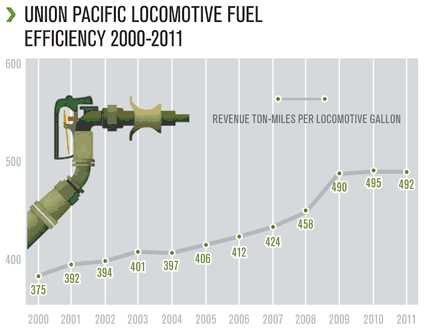BNSF plays a vital role in our nation’s economy. Rail carries more than 40 percent of our nation’s freight, and what we transport touches nearly every individual in all walks of life: grain, soybeans, lumber, steel, plastic, ethanol, coal and more. We do this while reducing emissions, saving fuel and relieving highway congestion.
A BNSF train can move one ton of freight 495 miles on just one gallon of diesel fuel.
Union Pacific can move one ton of freight 492 miles on a single gallon of diesel fuel. Meaning, that moving freight by rail instead of trucks reduces greenhouse has emissions by 75%.

Since 2000, Union Pacific have invested approximately $6 billion to purchase locomotives that meet the EPA’s updated emissions guidelines and an additional $200 million to upgrade older locomotives in our fleet to reduce emissions and increase fuel efficiency.
Our total greenhouse gas emissions in 2010 were 3,207 kilotonnes, which is 3.3% above 1990 levels despite a 44% increase in revenue-ton miles over the same period. A single CP train takes as many as 280 trucks off tax-payer funded roads, highways and infrastructure –equivalent to 1,100 cars. Trains reduce the pressure to build costly new roads and cut the cost of maintaining our current highway infrastructure.
CN is committed to renewing our fleet with more fuel-efficient locomotives through our annual fleet renewal program. This program will enable the Company to retire older locomotives with newer electro-motive diesel (EMD) locomotives. The new units produce 40 per cent less nitrogen oxides and are at least 15 to 20 per cent more fuel-efficient than the locomotives they will replace. All new locomotives will comply fully with the latest regulatory requirements to reduce locomotive emissions.
Among the Youngest Locomotive Fleets in the Industry
KCS’ locomotive fleet is among the youngest in the industry. From 2006 through 2008, the average locomotive fleet age was decreased from 17.2 to 10.9 years. This was accomplished through a combination of locomotive purchases, leases and overhauls, resulting in more fuel efficient, reliable and environmentally-friendly fleets.
Now Check out Your Own Footprint … Check out a cool carbon footprint calculator!
